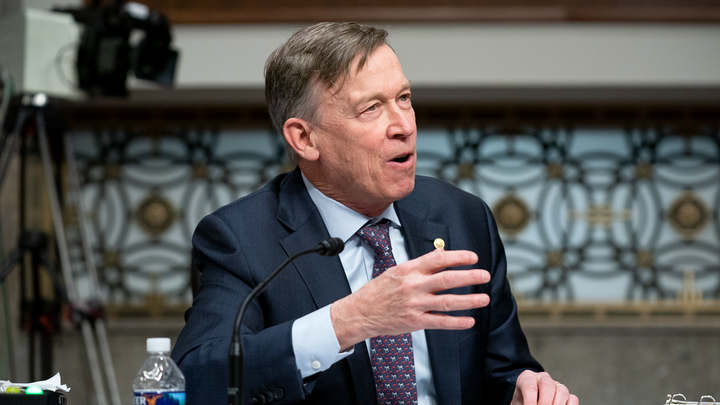The deadline for members of Congress to file their annual financial disclosures for 2021 was last week, May 16. But as usual, most members availed themselves of a 90-day extension that will give them until sometime in August to release their reports. The disclosures list their households assets, as well as other information like outside positions and travel reimbursements, and are often dumped online as hundreds of pages of illegible paper scans.
In the Senate, just 23 senators filed their 2021 annual disclosures by last week’s deadline. A review of this batch of disclosures shows that last year at least three more senators appear to have violated the STOCK Act’s requirement that they disclose certain financial transactions made by their households within 45 days.
Two senators, Democrats John Hickenlooper of Colorado and Gary Peters of Michigan, filed periodic transaction reports (PTRs) on May 16, 2022 for transactions they made in 2021. The transactions were also included in their 2021 annual disclosures. The third, Republican Jerry Moran of Kansas, has not yet addressed his missing periodic transaction report from last year for stock transactions that appeared in his 2021 annual disclosure for the first time.
The three are just the latest of dozens of members of Congress who have been found to have violated the STOCK Act’s timely reporting requirement recently. According to a tally maintained by Business Insider, at least 60 other senators and representatives have failed to report their trades in accordance with the law.
The STOCK Act, signed into law in 2012, requires members of Congress and other government officials to file PTRs within 45 days when they, their spouse, or their dependent children execute transactions worth more than $1,000 of stocks, bonds, and other securities.
Senator Hickenlooper’s errant PTR details five transactions his household made in 2021 that are listed in his annual disclosure: two sales of between $100,000 and $250,000 worth of stock in Liberty Broadband Corporation and Liberty Media Corporation by his spouse on March 15; a sale of between $100,000 and $250,000 in Liberty Broadband by his spouse on Sept. 1; a sale of between $250,000 and $500,000 in Liberty Media by his spouse on Nov. 12; and his own purchase on May 11 of between $15,000 and $50,000 worth of non-public stock in Skylark Lounge Holdings LLC, a Denver bar and music lounge.
Alyssa Roberts, communications director for Sen. Hickenlooper, told Sludge, “We missed filing these on time by mistake but we’ve implemented steps to prevent it from happening again.”
Sludge asked Roberts if Hickenlooper had taken a position on the various legislative items that have been introduced to limit the trading or ownership of individual securities by members of Congress while in office.
“Senator Hickenlooper supports legislation to restrict members of Congress from trading individual stocks,” said Roberts. “He believes we should prevent conflicts of interest and build on the disclosure and transparency already in place.”
This statement stops short of endorsing the Ban Conflicted Trading Act or any of the three similar bills that have been introduced in the Senate, and Hickenlooper has not joined as a co-sponsor of any of them.
Hickenlooper was an active stock trader in 2021, his first year in the Senate, filing seven PTRs for transactions including a six-day sell-off of technology company stocks in late October and early November. He reported fully unloading his holdings in Amazon, Alphabet, Apple, Facebook, and other tech companies, with a total maximum value of over $4 million.
The stock price of Liberty Broadband has declined around 23% since Hickenlooper’s spouse’s first partial sale of the asset on March 15, 2021, and the stock price of Liberty Media has declined by about 6% since that date.
Hickenlooper’s spouse, Robin Pringle Hickenlooper, has worked as senior vice president of corporate development at the Englewood, Colorado-based Liberty Media Corporation since 2010. Liberty Media’s assets include the Atlanta Braves baseball franchise and associated real estate projects, the Liberty SiriusXM Group that holds interests in SiriusXM and Live Nation Entertainment, and other sports companies in the Formula One Group. She sits on the SiriusXM board of directors, which is chaired by Liberty Media CEO Gregory B. Maffei, and she serves on the board of Chipotle.
Also on May 16, Sen. Gary Peters’ office filed a PTR for an Aug. 27, 2021 purchase listed in his annual disclosure of between $1,000 and $15,000 worth of stock in FS KKR Capital Corp., a credit solutions company. The senator did not file a PTR for the transaction last year as required by law. Sludge’s inquiries to Peters’ office about the transaction and STOCK Act compliance did not receive a response.
The second-term Peters has considerable influence over whether the Senate will move this year to limit stock transactions or ownership by its members. Peters is the chair of the Homeland Security & Governmental Affairs Committee, where two stock-trading reform bills have been referred: Sen. Jeff Merkley’s ban on federal lawmakers trading stocks, which was reintroduced last year after being introduced in the previous 115th and 116th Congresses, and Sen. Jon Ossoff’s ban on lawmakers owning individual securities other than through a blind trust, both of which have yet to receive a hearing or other legislative action. The Ossoff bill is seen as something of a companion to a bipartisan House measure, the TRUST in Congress Act (H.R. 336), introduced by Reps. Abigail Spanberger (D-Va.) and Chip Roy (R-Tex.), which has 63 House co-sponsors, including GOP Rep. Matt Gaetz of Florida and Democrat Ilhan Omar of Minnesota.
The chair of the Democratic Senatorial Campaign Committee this cycle, Peters was similarly a frequent stock trader last year, filing six PTRs. The Hill reported recently that he is part of a working group of Democratic senators seeking consensus on new laws on stock moves by members of Congress that could pass the upper chamber in this midterm elections year. The Homeland Security committee chair Peters reports owning between $15,000 and $50,000 worth of stock in Raytheon, which receives the vast majority of its revenue from federal defense contracts, as well as many assets in the fossil fuel industry such as electric company NextEra, Pacific Gas & Electric, and oilfield services company Schlumberger.
The 2021 annual disclosure for third-term Sen. Moran, who is running for re-election this year, lists two sales on Jan. 27, 2021 of up to a combined $30,000 in Costco stock by the senator and his spouse. The senator did not report the transactions in a PTR last year as required by law, and Moran’s office did not respond to a request for comment about his apparent STOCK Act violation. Moran is the ranking member of the Senate Appropriations Committee’s Subcommittee on Commerce, Justice, Science and Related Agencies, among other committee assignments. He is not a co-sponsor of any of the proposed bills to limit what securities lawmakers can trade or own in their households during their time in office.
In April, the House Administration Committee held a hearing on competing legislative proposals to address the conflicts of interest of senators and representatives as they set laws that impact their stock portfolios.
Sen. Elizabeth Warren has worked to reform the conflict-of-interest rules around lawmakers’ investments in securities since the introduction of her signature Anti-Corruption and Public Integrity ethics package in August 2018, which would have banned members of Congress from owning individual stocks. This year, Warren’s bipartisan ban on lawmakers owning individual securities was referred to the Committee on Banking, Housing, and Urban Affairs, where a hearing was held on April 5. Republican Sen. Lindsey Graham of South Carolina and Democrat Sen. Raphael Warnock of Georgia are among its co-sponsors.
In March, the nonpartisan ethics watchdog Citizens for Responsibility and Ethics in Washington (CREW) led a letter from 20 advocacy organizations to congressional leaders calling for “legislation prohibiting Members of Congress from owning or trading individual stocks, bonds or other similar financial investments.” The signing groups, which include Campaign Legal Center, Public Citizen, and MoveOn, lay down the marker that any reform bill include provisions “include a blanket ban on trading or owning any individual stocks… except widely held investment funds.” According to a national bipartisan poll commissioned by the nonprofit Campaign Legal Center released in November 2021, 67% of all voters favor banning members of Congress from owning stock in specific companies, and 78% of the public had “extremely serious concerns” with lawmakers trading stocks after receiving classified briefings.



